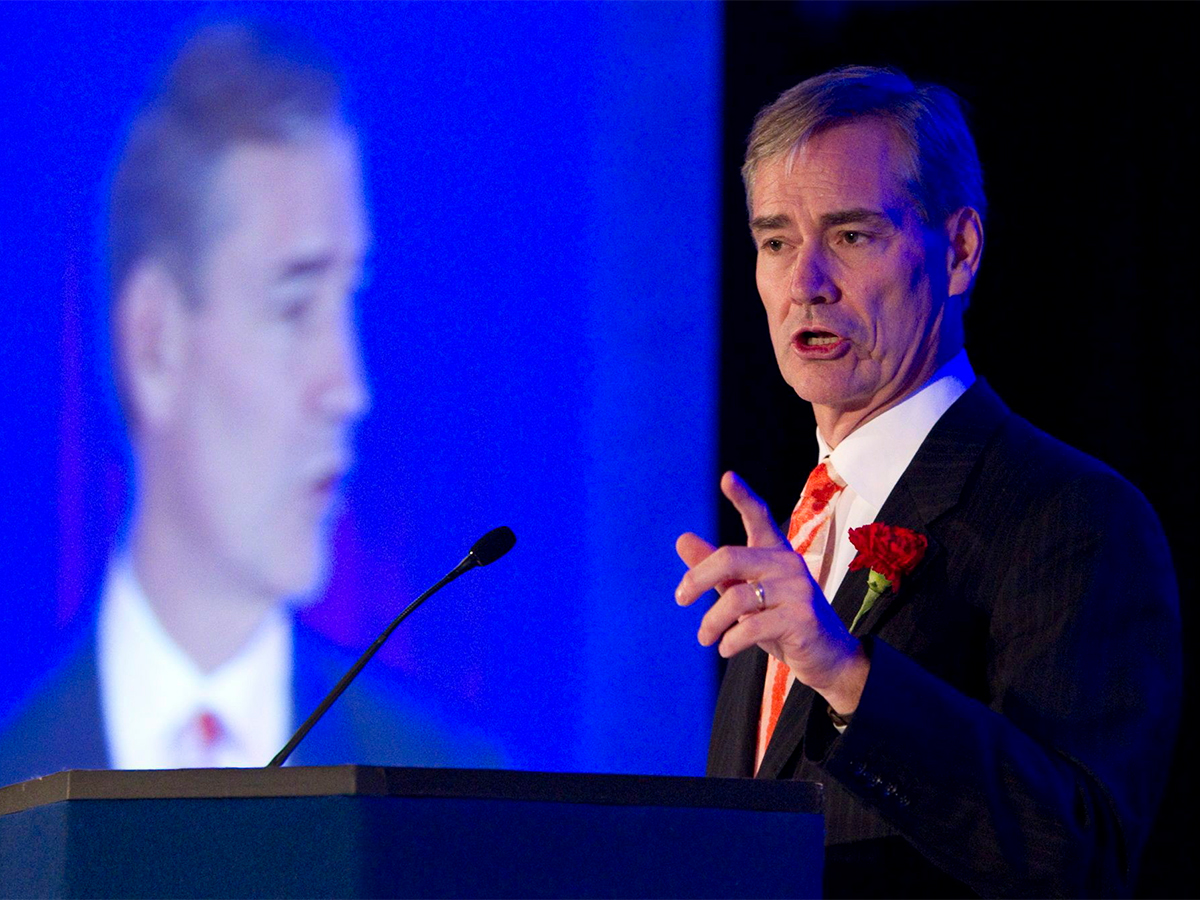Written by , Ryerson University. Photo credit THE CANADIAN PRESS/Darren Calabrese. Originally published in The Conversation.
Michael McCain, president and CEO of Maple Leafs Foods, speaks during the company’s annual general meeting in Toronto in April 2011.
While leaders often take pains to avoid controversial topics and the glare of hostile publicity, it is the sine qua non — the absolute necessity — of strong leaders to speak out about what’s right and wrong, especially at critical moments in history.
As one researcher has argued:
“Leaders fill the role of mythical heroes through actions such as saving companies, championing causes for the poor or disenfranchised, and defending our closely held beliefs.”
That includes those helming companies, in my opinion.
Michael McCain, the CEO of Maple Leaf Foods, demonstrated such leadership with his recent tweets defending liberal institutions and expressing outrage about the deaths of 57 Canadians, including the wife and son of one of his employees.
I’m Michael McCain, CEO of Maple Leaf Foods, and these are personal reflections. I am very angry, and time isn’t making me less angry. A MLF colleague of mine lost his wife and family this week to a needless, irresponsible series of events in Iran…
— Maple Leaf Foods (@MapleLeafFoods) January 13, 2020
This activist CEO called out an aggressive American act, undertaken at U.S. President Donald Trump’s behest, to assassinate a high-ranking Iranian official in Baghdad.
The targeted killing escalated tensions between the United States and Iran. Iranians then mistakenly directed missiles at Flight PS752 shortly after takeoff, killing 176 people, many of them bound for Canada.
Even though he’s faced mixed reactions on social media, McCain has helped to enhance a distinctly Canadian brand, Maple Leaf Foods, by defending Canadian values as the country still reels from the tragedy.
McCain wealth
McCain has been the president and chief executive officer of Maple Leaf Foods for a couple of decades. The billionaire is one of the wealthiest people in Canada. Although we may not like income inequality in Canada, it helps when we see wealthy people standing up for what’s right.
McCain has a track record of leadership and trying to do what’s right. In fact, he has said that doing the right thing was his goal, and in line with the company’s values, during the company’s 2008 listeria crisis. Instead of covering up the extent of the outbreak, McCain was fully transparent and took full responsibility.
“Knowing there is a desire to assign blame, the buck stops here,” he said. “I emphasize: this is our accountability and it’s ours to fix.”
McCain knew that Canadians have to trust a company producing the food they eat, and the Maple Leaf brand recovered from the crisis.
The CEO’s actions were not only ethical, but they also demonstrated his business acumen and effective communication skills. He understood the value of a corporate brand and that a good reputation must back it up. Indeed, research has shown reputation can motivate consumer purchase intentions.
Siemens’ puzzling coal move
Contrast this to the recent baffling announcement made by Joe Kaeser, CEO of Siemens, the German engineering giant. Kaeser, the company’s highest paid executive with an annual salary of US$9.6 million, says that although he knows it’s the wrong thing to do, his firm will remain on the controversial Adani project, a huge coal mine in Australia.
As Australia’s horrific, climate change-fuelled bush fires rage on, possibly wiping out entire species, Kaeser’s decision shows incredibly poor judgment. He has dismayed employees by seemingly tossing aside Siemens’ carefully cultivated environmental corporate reputation and tarnished the brand, all for a relatively small US$20 million project. Siemens is a US$100 billion company.

The mine stands to add to climate change and further damage Australia’s Great Barrier Reef, already battered by bleaching due to rising ocean temperatures and marine heatwaves. Dubbed the “world’s most insane energy project” by Rolling Stone magazine, protesters around the world have made their opposition known.
A Bloomberg opinion writer called Kaeser’s announcement one of the “strangest pieces of executive communication,” noting that the Adani project doesn’t even make economic sense, especially with the declining price of coal.
In fact, Siemens has cut thousands of jobs from a related energy division it plans to spin off. In other words, Kaeser sold out his multinational’s reputation for a project not even part of Siemens’ future. He says that he doesn’t see a legal way out of the contract the company signed with India’s Adani.
Although some may claim that it’s easy for McCain to use his company’s corporate Twitter feed however he likes because he owns a good chunk of the business he leads, both men lead publicly traded companies and have shareholders to consider.
With all of Kaeser’s millions, and Siemens’, he could walk away, just as McCain could risk a dent in his company’s stock price with his surprising tweets about Trump. As it were, Maple Leaf Foods share prices dipped briefly but soon recovered, suggesting there will be no lasting damage from McCain’s tweets. In fact, many of us may recognize the brand now even more when we’re in grocery stores, and Maple Leaf Foods’ employees, customers and other stakeholders will know the Canadian company can be trusted to do the right thing.
The difference is leadership, not corporate structure. Both men can make independent decisions. But only one is a leader, and that’s Michael McCain.

